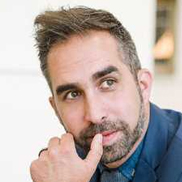Sustainable smart cities, transport systems and agriculture
During this break-out session, Frederic Dreyer will present concrete examples, coming from fundamental, basic and applied research, on how the use of digital tools such as IoT monitoring, AI/ML applications, digital twins, and systems-of-systems modeling to foster a more sustainable and inclusive development of cities and its infrastructures.

A focus on challenges linked to citizen mobility and transportation will be highlighted, indeed from daily commute to accessibility of leisure, commerce, education, and healthcare, transportation mapping is a topic that has attracted much research within urban sciences, and is highly connected to sustainable cities’ layers.
Challenges around :
- mapping multi-modal urban transportation network as public transportation and city transit planning, researchers in urban transportation networks, and industry partners in mobility technology.
- Data collections & methods of data-gathering and flexibility are crucial points of interests, as they are particularly relevant to policy/ making and more direct innovative solutions (self-driving cars, public transportation, etc.),
- Such topic is also a particular interest in the context of ongoing shifts in the post-pandemic world, directly addressing issues such as pandemics and climate change, as well as the changing spatial relationships of life and work.
About Fustic
Cities are focal points of major environmental and social problems and, at the same time, important places of innovation. Hosting more than 50% of the world-wide population, cities consume 75% of total energy and produce over 75% of global CO2 emissions, and are therefore one of the biggest contributors to some of our worst planetary problems: air, water, and soil pollution, decline in biodiversity, the climate crisis, and impacts on human health.
The School of Architecture, Civil and Environmental Engineering (ENAC) of the EPFL and its association FUSTIC want to promote industry-governmental-academia knowledge exchange and uptake through a co-creation approach to provide innovative solutions to drive the transition towards a sustainable and resource-efficient society. There is an urgent need for rethinking urban and territorial planning and developing new policies. The digital transformation has the potential to provide new ways of designing, constructing and sensing infrastructure and buildings and to contribute to climate neutrality, and health and well-being.
Frédéric Dreyer is a Doctor of Science from EPFL and holds Master's degrees in Mechanical Engineering, Materials Science and Environment, as well as an Executive MBA (HEC Geneva).
With a solid experience of more than 10 years in the industry, Frederic has contributed to major innovations in microtechnology.
Previous Director at Geneva State department, he was in charge of innovative projects such as the European study of feasibility of drone-taxis and autonomous on-demand shuttles for industrial areas ; he also allowed Geneva State to support companies on their 4.0 transformation in an ever-changing ecosystem.
Currently in charge of Innovation and partnerships at ENAC, EPFL’s faculty, also mentor and coach for start-up and SME, accredited by Federal Innosuisse and Cantonal Platinn institutions, co-founder of SwissInspect startup, specialized in predictive and prescriptive maintenance of infrastructures.
Ffounder of FUSTIC association, hosted at EPFL, dedicated to promote the societal and ecological transition by championing research in digital technology and sustainable cities, regions and infrastructure.